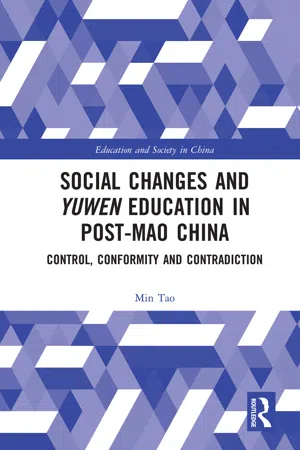
Social Changes and Yuwen Education in Post-Mao China
Control, Conformity and Contradiction
- 208 pages
- English
- ePUB (mobile friendly)
- Available on iOS & Android
About This Book
Inspired by the author's observations of the language curriculum as a practising teacher for the past 20 years, this book addresses how the high school Chinese language and literacy ( Yuwen ) curriculum in China was controlled and directed in the post-Mao era. Examining the social and political domination from 1980 to 2010, the book offers insights into how teachers and schools responded to the top-down curriculum change in their teaching practice.
This book discusses some of the most important questions concerning China and its education system: What changes have occurred in the Chinese language and literacy curricula; how and why the changes have occurred; who has been in control of the process and outcome; and what impacts the curriculum changes may bring not only to China but to the international sectors that "export" education and degrees to China and Chinese students. The author provides answers to these questions crucial to both the contemporary Chinese society and the students who come out of that system. This critical inquiry of the Yuwen curriculum and its implementation provides a valuable and timely showcase for understanding the ideology of China's future generation and the social and political transformation in the past three decades. In addition to researchers, this book is expected to have impact on policymakers in China and beyond, where Chinese migrants and international students constitute a substantial learning population.
Frequently asked questions
Information
Table of contents
- Cover
- Half Title
- Series Page
- Title Page
- Copyright Page
- Dedication
- Contents
- List of figures
- List of tables
- Acknowledgements
- 1 Introduction
- 2 Social approaches to literacy studies and language and literacy curriculum studies: Western perspectives and disputes
- 3 Ideological control and subject autonomy: Major debates on Yuwen education in China after 1949
- 4 Scope and methods
- 5 From Mao’s literate subjects to high Suzhi (quality) literate citizens: High school Yuwen syllabuses in the post-Mao era (1978–2003)
- 6 Whose texts and what texts: Findings from textbook analysis
- 7 Yuwen teachers’ perceptions of and reactions to the curriculum changes
- 8 Discussion and conclusion: Text and power
- Appendices
- Bibliography
- Index